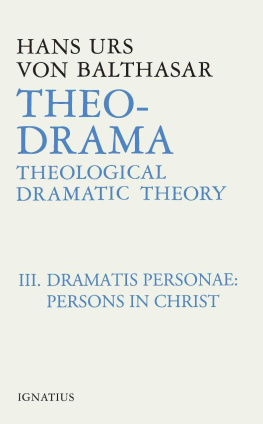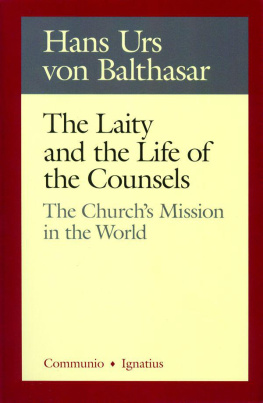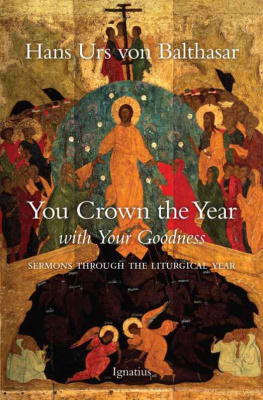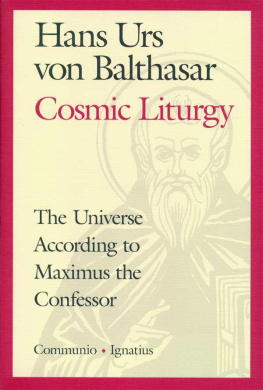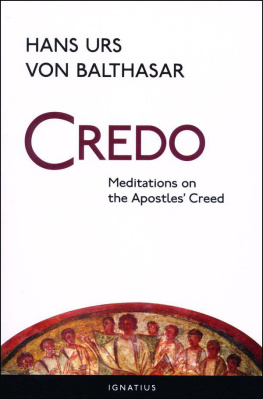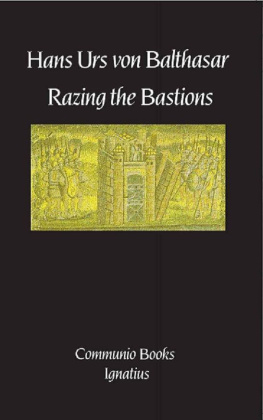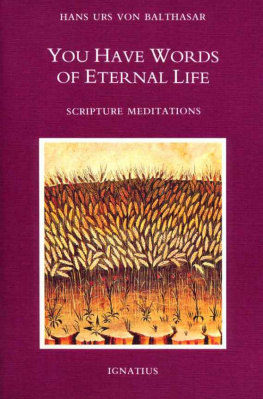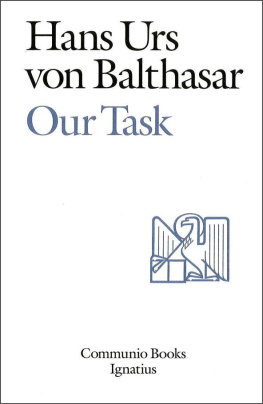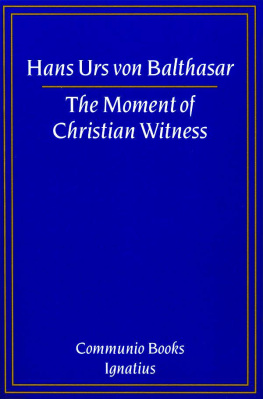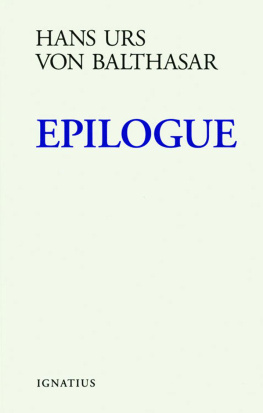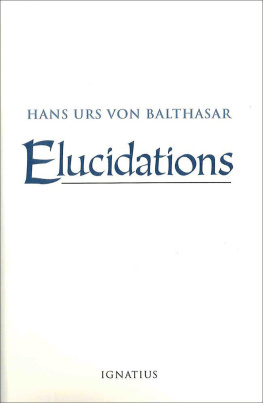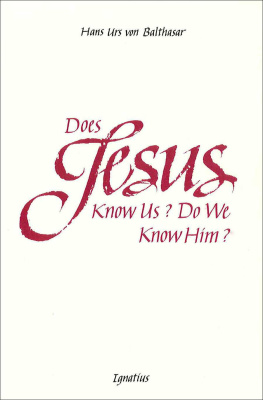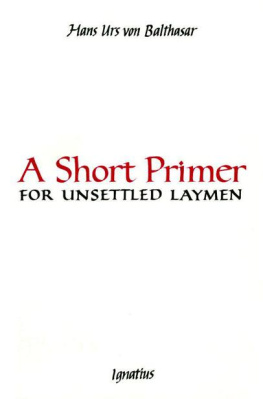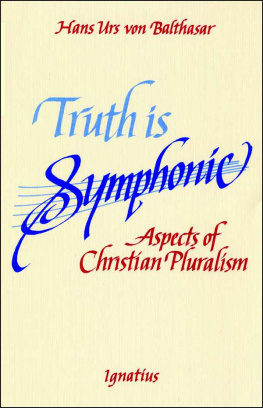Hans Urs von Balthasar - New Elucidations
Here you can read online Hans Urs von Balthasar - New Elucidations full text of the book (entire story) in english for free. Download pdf and epub, get meaning, cover and reviews about this ebook. year: 2007, publisher: Ignatius Press, genre: Religion. Description of the work, (preface) as well as reviews are available. Best literature library LitArk.com created for fans of good reading and offers a wide selection of genres:
Romance novel
Science fiction
Adventure
Detective
Science
History
Home and family
Prose
Art
Politics
Computer
Non-fiction
Religion
Business
Children
Humor
Choose a favorite category and find really read worthwhile books. Enjoy immersion in the world of imagination, feel the emotions of the characters or learn something new for yourself, make an fascinating discovery.
- Book:New Elucidations
- Author:
- Publisher:Ignatius Press
- Genre:
- Year:2007
- Rating:3 / 5
- Favourites:Add to favourites
- Your mark:
- 60
- 1
- 2
- 3
- 4
- 5
New Elucidations: summary, description and annotation
We offer to read an annotation, description, summary or preface (depends on what the author of the book "New Elucidations" wrote himself). If you haven't found the necessary information about the book — write in the comments, we will try to find it.
New Elucidations — read online for free the complete book (whole text) full work
Below is the text of the book, divided by pages. System saving the place of the last page read, allows you to conveniently read the book "New Elucidations" online for free, without having to search again every time where you left off. Put a bookmark, and you can go to the page where you finished reading at any time.
Font size:
Interval:
Bookmark:
New Elucidations
Hans Urs von Balthasar
Elucidations
Translated by
Sister Mary Theresilde Skerry
Holy Spirit Adoration Sister
IGNATIUS PRESS SAN FRANCISCO
Title of the German original:
Neue Klarstellungen
1979 Johannes Verlag, Einsiedeln
Cover by Victoria Hoke Lane
With ecclesiastical approval
1986 Ignatius Press, San Francisco
All rights reserved
ISBN 978-0-89870-041-1
Library of Congress catalogue number 85-82031
Printed in the United States of America
From among the host of burning issues, a few themes have been selected. Some lie on the surface of reality, others in the depths of the essential. For some a brief mention had to suffice, while others required longer consideration. No one should assume that together they make up a rounded whole; a number of times they even jostle hard against one another. If Jesus is supposed to shine through, then how can he be so absent? And if his absence is emphasized, how can we immediately proceed to speak of his presence in the Churchsomething that many feel is not sufficiently defended? Likewise, some of the things said regarding the states of life in the Church do not agree with each other at first sight. And this is only right. Neither theology nor life in the Church form a comfortably comprehensible system. Wherever God is involved, paradoxes accumulate to challenge the human mind, paradoxes that cannot be reduced to a common denominator by means of subtle dialectical methods. The choice of themes offered here may accentuate the rigidity of the paradoxes; by inserting additional subjects, a deeper harmony could have been indicated. But perhaps it is more stimulating for the reader to build the bridges or to discover the latent existing ones on his own. They must be there, because all the themes revolve closely around the core of the Christian mystery.
Some of these essays have been previously published as follows:
Does Jesus Shine Through?, Communio (1968), 319ff.
Experience God?, Communio (1976), 497ff
The Absences of Jesus, Geist und Leben (1971), 239ff.
The Church of Jews and GentilesToday, Communio (1976), 239ff.
The Church as the Presence of Christ, broadcast over Bavarian Radio (1978).
The Mystery of the Eucharist, Geist und Leben (1970), 173ff.
The Worthiness of the Liturgy, Communio (1978), 481ff.
Christian and Non-Christian Meditation, Christliche Innerlichkeit (Mariazell, 1975), 47ff.
Are there Lay People in the Church?, Communio 2 (1979).
A Word on Humanae Vitae , lecture at a symposium in San Francisco (1978), subsequently published in Christian Married Love (Ignatius, 1981).
Obedience in the Light of the Gospel, Zur Pastoral der geistlichen Berufe vol. 16 (1978), 17ff.
Fragments on Suffering and Healing, Communio (1977), 193ff.
Martyrdom and Mission, 85th German Catholic Day (Paderborn: Bonifacius, 1978), 184ff.
Are There Lay People in the Church? and A Note on Lay Theologians were translated into English by Graham Harrison; A Word on Humanae Vitae was translated by Erasmo Leiva-Merikakis. The remaining essays in this book were translated by Sister Mary Theresilde Skerry.
Everything that can be proved can also be disproved, George Simmel has said, perhaps in jest. With these words, he wanted to indicate deeper forms of knowledge in the sphere of the living and the personal. But this sphere too stands in the midst of the world of facts with which the proofs and their refutation have first of all to contend; for facts themselves always exist within contexts which function one way or another and shed various lights on them.
Jesus of Nazareth likewiseand essentiallyexists in a historical context and thus in the melee of proofs and refutations. One cannot object too much when Jaspers counts him, along with Socrates, Buddha and Confucius, among the norm-setters, although this classification evades the decisive question of Jesus claim. But did he really make this claim to be the sole Savior sent from God? Former times had no difficulty in their apologetics for him: Jesus worked miracles in order to support his teaching; he fulfilled the prophecies that pointed to him; the men who bear witness to him are truthful; the Church he founded embraces the whole world, geographically as well as qualitatively. Not one of these proofs has remained undisputed. We have analogous miracle stories about contemporaneous heathen thaumaturgists; of the explicit prophecies, only a small number pointed to him, and he himself evidently rejected the titles of Messiah and King for himself; subjectively, the witnesses to Jesus may have been men of good faith, but, it is said, they obviously tinkered with his words and deeds, projected their faith into their portrayal of his figure and finally (John) raised him to heights to which his own words had never strayed. And the spread of his Church is today no more impressive than that of other religions or ideologies. The Churchs qualitative catholicity may be evident to the faithful, but viewed from without it is less obvious.
Apparently, apologetics must, on the whole front, disengage itself from the enemy while battling in retreat. The central data upon which the phenomenon of Jesus seemed to rest are contested: above all, the Resurrection. (What actually happened, then, behind the contradictory reports?) And when this falls, naturally the Cross, interpreted in the light of the Resurrection, falls. Then its significance for salvation becomes unknowable, and after it the singular claim made in Jesus public life, which could readily have been projected back into the events, and so forth.
But is Jesus effect on history not an incomparable one, so that world history is rightly divided into a time before him and after him? Some would on the whole readily concede this effect, but at the same time underline its ambiguity at least. Martyrs and saints: well and good, but do not other religions, and even forms of atheism, have theirs? And then there are the consequences even into modern times of Constantines mixing of state and church: the state-appointed bishops, the Inquisition, the Crusades, Galileo, Giordano Brunos death at the stake, the obscurantism of popes even in the last century, infringements in the area of ecclesial infallibility (such as the erroneous instructions of the Bible Commission). But far more important than all these is the inability to carry out Jesus fundamental commandment: on the one hand to be in solidarity with the poor and not with the rich (with the result that Marxism apparently had to intervene correctively, in order to show what really should have happened), and on the other hand to give the one proof of his having come, that of being one in him as he and the Father are one. Instead we have wrangling and the disintegration of ecclesial unity, so that any apologetic argument which the Church puts forth in her own defense is in vain. However, we are not inquiring here about the failure of Christians but about the argument in favor of Jesus. Does it still shine through in our day?
It may have been Conzelmann who said that the Church thrives on the ignorance of the matters with which exegesis deals. Now precisely this ignorance (in part patently willful) is nevertheless a noteworthy phenomenon. It shows that for the majority of the people who are interested in Jesus, the portrait of him which emerges as a unity from the New Testament documents is far more convincing than the subtleties of exegesis, which dissects this unity and produces results that are seldom more than probabilities. And even if now and then these conclusions were to approach certainty, this approach would not prevail against the incontrovertible unified effect of the intact figure of Jesus. It may be that Jesus did not utter this or that saying expressly as recorded; nevertheless, it evidently remains the appropriate interpretation of his attitude. The Christian would say that the Holy Spirit, who inspires the evangelists, gives them the right turn of phrase to express correctly the situation and Jesus unique reaction within it. This applies even to such momentous words as the self-interpretations of Jesus in John; I am light, life, truth, the way, the resurrection, food unto eternal life....
Next pageFont size:
Interval:
Bookmark:
Similar books «New Elucidations»
Look at similar books to New Elucidations. We have selected literature similar in name and meaning in the hope of providing readers with more options to find new, interesting, not yet read works.
Discussion, reviews of the book New Elucidations and just readers' own opinions. Leave your comments, write what you think about the work, its meaning or the main characters. Specify what exactly you liked and what you didn't like, and why you think so.


